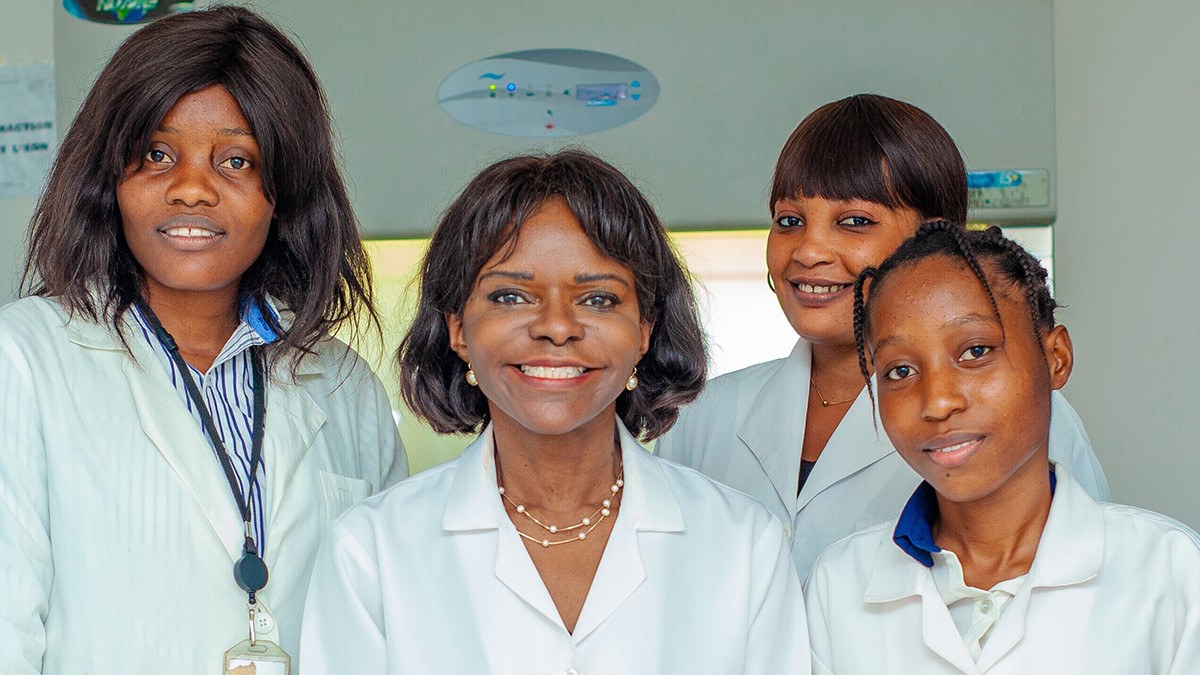Play all audios:
Women in science are still severely underrepresented in Central African countries such as Chad (3.4%), the Democratic Republic of the Congo (8.7%), Guinea (9.8%) and the Republic of the
Congo (12.8%). _Nature Africa_ spoke to parasitologist and epidemiologist, Francine Ntoumi, from the University Marien-Ngouabi in the Republic of the Congo. She has been a keen advocate for
change over the course of her 30-year career. She is the founding president of the Congolese Foundation for Medical Research (FCRM) that has, since 2014, launched efforts to empower women to
pursue a career in science. She was the first person from Africa to lead the secretariat of the Multilateral Initiative on Malaria, and the first woman from Sub-Saharan Africa to receive
the Georg Foster research award, for creating networks to combat infectious diseases across Africa. _Nature Africa_ talked to her about the importance of “making research a feminine
ambition”, as she likes to say. WHAT DRIVES YOUR QUEST TO DEVELOP OTHER FEMALE SCIENTISTS? I believe women scientists have a vital role to play in Africa's development, as is recognised
in the Sustainable Development Goals, but because they are underrepresented in many scientific disciplines, women cannot realise their potential and contribute effectively to help solve
developmental challenges. We need to change stereotypes about science being only for males. Research groups with women have significantly better results than exclusively male ones1. WHAT
HINDERS MORE WOMEN FROM PURSUING SCIENCE IN SUB-SAHARAN AFRICA? The underrepresentation in sub-Saharan Africa is caused by political, institutional and individual factors. Many countries
have adopted science, technology, and innovation policies, some of which are aimed at promoting women's participation in science, but these are rarely implemented. Gender biases and
stereotypes persist and the absence of programmes specifically encouraging women in science, coupled with an ill-defined career path, make it difficult to attract and retain female
scientists. YOU ARE PARTICULARLY FOCUSED ON PROMOTING THE PARTICIPATION OF WOMEN IN SCIENCE IN CENTRAL AFRICA. WHY IS THAT? Central Africa is not very dynamic in terms of scientific research
in general, including in the field of health. Compared to other regions of Africa, its scientists receive few national and international grants and produce a low number of publications in
peer-reviewed journals. YOU FOUNDED THE CONGOLESE FOUNDATION FOR MEDICAL RESEARCH (FCRM) IN 2008, AND ARE STILL ITS PRESIDENT. HOW DOES IT SUPPORT WOMEN IN SCIENCE? It is unacceptable that
in the DCR, where I come from, only 12% of scientists are female. The FCRM therefore in 2014 implemented the Women and Sciences programme under the banner “making research a feminine
ambition”. It consists of awareness-raising activities in schools, poster campaigns for the general public, the awarding of scholarships for Masters students and encouragement prizes for
Congolese women scientists. This year, the FCRM collaborated with the Bayer Foundation (Germany) to organize the first sub-regional edition of Women and Science scholarships for PhD students
and women scientists and mothers-to-be from Cameroon, Gabon, Democratic Republic of Congo, Chad, Republic of Congo, Equatorial Guinea, Central African Republic.

